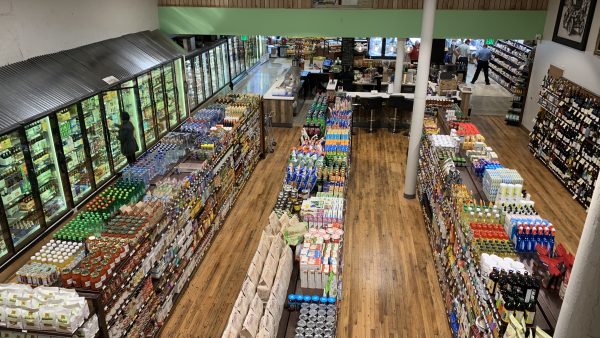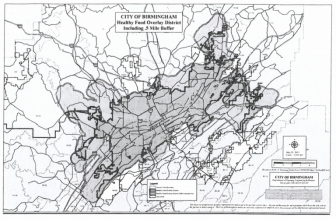Birmingham City Council Approves Healthy Food Overlay District
By Sam Prickett
The Birmingham City Council voted Tuesday to establish a “healthy food overlay district,” designed to make healthy food options more accessible for the approximately two-thirds of the city’s population that lives within food deserts.
The healthy food overlay district will cover areas of Birmingham defined by the U.S. Department of Agriculture as “low-access census tracts,” where “a significant number (at least 500 people) or share (at least 33%) of the population is greater than half a mile from the nearest supermarket, supercenter, or large grocery store.” The final version of the ordinance also establishes a half-mile “buffer” around the overlay district, within which restrictions on dollar stores will still apply.
The Healthy Foods Ordinance, first announced by Mayor Randall Woodfin in February, will limit the spread of dollar stores within that overlay district while loosening regulations on grocery stores, mobile grocers and farmers markets citywide.
The new law will prevent new “small box discount stores” — businesses such as Dollar General and Family Dollar — from opening within one mile of already extant small box discount stores.
Josh Carpenter, Woodfin’s director of innovation and economic development, told BirminghamWatch in April that this is because such stores “divert the customer base away from regular grocery stores or supermarkets or full-service grocery stores… Lots of research has demonstrated that dollar stores actually contribute to a loss of grocery stores over time.” According to Carpenter, five grocery stores in Jefferson County closed between 2005 and 2015.
Carpenter also said that the new restrictions might make Birmingham more enticing to potential new grocers. “We decided that curbing the growth of dollar stores might actually help us when we go out and recruit a full-service grocery store by saying, ‘Hey, you won’t have to worry about another dollar store coming in and eating into your customer base,’” he said. According to a report released in March by the Woodfin administration, three grocery store chains have declined invitations to expand into the city’s food deserts.
Other changes made by the Healthy Foods Ordinance to the overlay district include the loosening of parking and square-footage restrictions on grocery stores, as well as allowing community gardens to sell produce on-site.
The ordinance also provides for several citywide changes, including an increase of the number of days per year that farmers markets and market stands can operate. It also allows mobile grocers to operate in residential neighborhoods, so long as they are compliant with Jefferson County Department of Health regulations, are farther than 1,000 feet from brick-and-mortar grocers and do not operate for more than three consecutive days at the same location.
The council passed the ordinance 8-0; Councilor Steven Hoyt, who had been a vocal proponent, was absent.
The Healthy Food Ordinance follows — but is separate from — an ordinance passed in May allocating $500,000 toward incentives for new grocery stores.
HUD proposes time limits and work requirements for rental aid
The rule would allow housing agencies and landlords to impose such requirements "to encourage self-sufficiency." Critics say most who can work already do, but their wages are low.
Paramount and Warner Bros’ deal is about merging studios, and a whole lot more
The nearly $111 billion marriage would unite Paramount and Warner film studios, streamers and television properties — including CNN — under the control of the wealthy Ellison family.
A new film follows Paul McCartney’s 2nd act after The Beatles’ breakup
While previous documentaries captured the frenzy of Beatlemania, Man on the Run focuses on McCartney in the years between the band's breakup and John Lennon's death.
An aspiring dancer. A wealthy benefactor. And ‘Dreams’ turned to nightmare
A new psychological drama from Mexican filmmaker Michel Franco centers on the torrid affair between a wealthy San Francisco philanthropist and an undocumented immigrant who aspires to be a dancer.
Bill making the Public Service Commission an appointed board is dead for the session
Usually when discussing legislative action, the focus is on what's moving forward. But plenty of bills in a legislature stall or even die. Leaders in the Alabama legislature say a bill involving the Public Service Commission is dead for the session. We get details on that from Todd Stacy, host of Capitol Journal on Alabama Public Television.
My doctor keeps focusing on my weight. What other health metrics matter more?
Our Real Talk with a Doc columnist explains how to push back if your doctor's obsessed with weight loss. And what other health metrics matter more instead.









